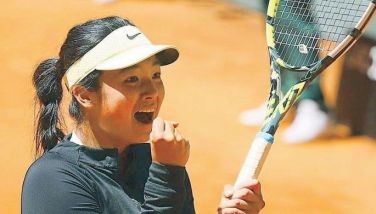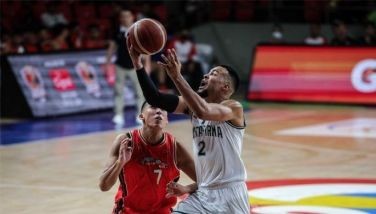The 10,000-hour rule
If you want to master anything, you have to put in 10,000 hours of practice to get to that level.
That theory has been used to explain prodigies in almost everything, especially in sports. I first came across the 10 thousand-hour rule in Malcolm Gladwell’s 2008 book, “Outliers: The Story of Success”. In it, he posits that anyone wishing to reach the highest level of his or her chosen craft must invest that specific number of hours, or the equivalent of three hours a day for roughly 10 years. If you were to start learning a sport at about the age of five, you would be achieving outstanding international-level performance like a Boris Becker by the age of 16 (when the German teen started conquering Wimbledon).
“What’s really interesting about this 10,000-hour rule is that it applies virtually everywhere,” Gladwell once said at a press conference. “You can’t become a chess grandmaster unless you spend 10,000 hours on practice.”
The only exception Gladwell notes is chess grandmaster Bobby Fischer, who reached the pinnacle of success in only nine years. Of course, this presupposes natural talent and a supportive environment to begin with.
Daniel Levitin, Ph. D., is a cognitive psychologist, neuroscientist, writer, musician and record producer who concurs.
“Ten thousand hours of practice is required to achieve the level of mastery associated with being a world-class expert – in anything. In study after study, of composers, basketball players, fiction writers, ice skaters, concert pianists, chess players, master criminals, and what have you, this number comes up again and again. Ten thousand hours is the equivalent to roughly three hours per day, or 20 hours per week, of practice over 10 years,” Levitin writes in “This is Your Brain on Music: the Science of a Human Obsession”. Of course, this doesn’t address why some people don’t seem to get anywhere when they practice, and why some people get more out of their practice sessions than others. But no one has yet found a case in which true world-class expertise was accomplished in less time. It seems that it takes the brain this long to assimilate all that it needs to know to achieve true mastery.”
Levitin theorizes that it takes that long for the human brain to assimilate all that it needs to achieve a high-level of performance at a chosen task. Of course, one also has to reach a basic level of competence first. In the beginning, we all go through what is called explicit learning, going over our movements step by step, like a child learning something new. Lack of familiarity with what we are doing requires us to go through something more slowly and steadily, getting each position right. From there, we can “do it with our eyes closed”, which is the next level, implicit learning. At this stage, we’re basically doing drills designed to “groove” the movement into our muscle memory and our mind’s memory, as well. This explains why athletes seem bored with the fundamentals, then kick it up a notch when they get to scrimmages wherein they can incorporate everything they’ve learned over the years.
British scientists conducted a study at the Berlin Academy of Music and found that outstanding violinists had reached 10,000 hours of practice by the age of 20, while those who were merely good had only practiced about 8,000 hours. So there seems to be empirical proof that 10,000 hours is a threshold figure. Gladwell even compares Asian students and Western students in terms of mathematical ability. It seems that Asian students have been trained to spend more time and be more patient in handling complicated math problems, and as a result are comparatively more successful in solving them.
What does all this mean? Essentially it means that, using sports as an example, there is a certain incubation period before one achieves breakthrough success. It all must begin, however, with your natural desire to excel in your chosen sport. It is the person’s innate desire (not their parents’) that will keep them driven. Also, 10 years may seem like a long time, unless you also have other things to fill your day. Students have to study, adults have to work. Unless you are in a sports academy of music school, your free time will most likely be limited. The world’s greatest athletes will tell you that they looked forward to training even when they were little kids. Tiger Woods started playing golf around the age of four. Gymnasts routinely begin back-breaking exercises at about that age. Many basketball schools accept students around the age of five or six.
But even if you don’t start that young, look at yourself as a work in progress. Ten thousand hours is three hours a day for 10 years. If you put in more time, you achieve mastery faster. Some PBA teams train up to six hours a day, including video sessions, weights, roadwork, drills and scrimmages. All that contributes to their achieving a higher level of knowledge of their game. And remember, it is not just your body that needs practice, it’s also your mind. You have to maintain a certain amount of focus, or you’ll develop bad habits, no matter when you start taking something seriously.
Also, you can work on your reflexes, alertness, patience, and other skills. Years ago, experts believed golfers should avoid weights because it would ruin their swings. Now, going to the gym has helped many of the world’s best golfers, and has improved their mental clarity and endurance, particularly in challenging tournaments. The America’s Cup team of Dennis Connor use visualization techniques for years, until they had been victorious in their minds over 4,000 times.
The actual yacht race against Australia became a piece of cake.
Ten thousand hours may seem like a lot, but not if you have a long-term goal. Rushing your development may cause you frustration and worse, injury, which will set you back even further. Ten thousand hours may seem intimidating, but like my younger son once said when I told him he needed 10 thousand hours to master the game of basketball, “Hey, I’m halfway there!” It’s like saving for your future.
- Latest
- Trending



























